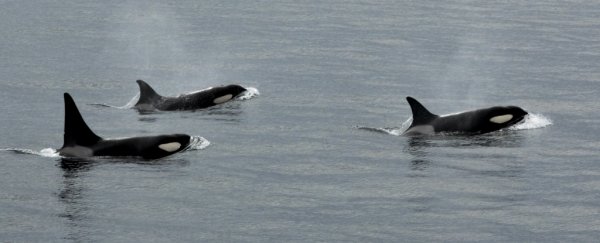The great white shark is often viewed as the most hardcore thing in the ocean. The top of the food chain. The silent slayer in the dark. But evidence is increasingly emerging that even the great white isn't safe. In fact, these fish too are prey.
Their predator? The orca (Orcinus orca): they of the deep cunning. And an incredible new video shared online shows orcas chasing off great white sharks (Carcharodon carcharias) near the coast of South Africa.
The encounter took place at Seal Island in Mossel Bay on the Western Cape - a small, rocky island that is home to a colony of around 3,000 brown fur seals (Arctocephalus pusillus).
Because of that (and other wildlife, such as penguins), it's a popular hunting ground for the great whites, and a popular location for tourists to see and dive with the glorious beasts. That is, until a pod of orcas shows up like a squad of punks to have their own fun.
In a video filmed by shark conservationist Elton Polly and uploaded to Facebook by Mossel Bay-based conservation organisation Oceans Research, the fin of a shark can be seen cutting through the waves.
Then, the orcas appear in hot pursuit.
"Orcas were spotted chasing a white shark, and a few other white sharks were in the vicinity at the time. One white shark appears to be unnerved by the presence of the orcas, but another shark didn't seem too perturbed," Oceans Research wrote on Facebook.
"We'll monitor the orca and white shark activity over the next few days, to see [if] there are any behavioural changes."
It's difficult to tell if the orcas are indeed engaged in a coordinated manoeuvre, if they're just playing, or if their behaviour is coincidental. However, recent evidence seems to suggest that the two predators don't get along - and orcas come out on top.
Recent research found that when orcas show up at a great white hunting ground, the sharks tend to make themselves scarce, disappearing within minutes, and staying away for the rest of the season.
"When confronted by orcas, white sharks will immediately vacate their preferred hunting ground and will not return for up to a year, even though the orcas are only passing through," said marine ecologist Salvador Jorgensen of Monterey Bay Aquarium.
And the carcasses of great whites killed by orcas have been washing ashore on the Western Cape, punctured with bite marks and, curiously, missing their livers. Orcas have been seen eating the livers of other sharks, so it's not too difficult to figure out what is going on.
Great white shark livers are huge, weighing in at hundreds of kilograms. And they're packed with calories, obtained from the fat of the seals they eat. According to a 2013 paper, a 456-kilogram (1,000 lbs) great white shark liver contains around 400 litres of oil - delicious, calorie rich oil. This helps to keep the sharks buoyant and supplied with nutrients as they migrate.
It's also a really tasty treat for orcas: like eating a fatty doughnut, or bacon fried in butter - not just a delicacy, but a deeply sustaining meal in the often harsh conditions of the oceans.
So it's no surprise to see a great white turn tail and flee when an orca decides to make chase. Wouldn't you?
You're much safer with orcas than sharks, though - orcas have never, to the best of our knowledge, killed a human in the wild.
